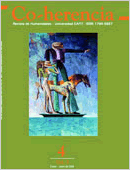Discurso argumentativo y auditorio
Main Article Content
Keywords
Argumentation, speaker, audience, matter of agreement, argumentativespeech
Abstract
Usually, it is acceptable to say that argumentation depends on the speaker and the audience. But we know that we can understand an argumentative text beyond the circumstances of its emission. These postulates are compatibles. However, we need two conditions for the constitution of the knowledge in argumentation: First, it demands a specification about the role of the knowledge of, both, speaker and the audience. Second, we must to establish the knowledge of the discourse, itself. In order to satisfy this demands, this article display two parts: a)the concept of argumentation, with a hypothesis about the way as the receptor define that an speech is argumentative. b) A hypothesis about the way as the interpreter can to know to the speaker and the audience.
Downloads
Download data is not yet available.
References
Aristóteles (1994) Tratados de lógica (Órganon), Madrid, Gredos.
Austin, J.L. (1998) Cómo hacer cosas con palabras, Barcelona, Paidós.
Bolaños G., Bernardo (2002) Argumentación científica y objetividad, México, Universidad Nacional Autónoma de México.
Cohen, Morris y Nagel, Ernest (1993) Introducción a la lógica y al método científico, Buenos Aires, Amorrortu.
Eco, Umberto (1995) Semiótica y filosofía del lenguaje, Barcelona, Lumen.
Habermas, Jürgen (2003) Teoría de la acción comunicativa, I, Madrid, Taurus.
Husserl, Edmund (1995) Investigaciones lógicas, Barcelona, Altaya.
Naranjo, María Sandra (1998) “Lógica jurídica y teoría de los actos lingüísticos”. En: Argumentación. Cali, Universidad del Valle, pp. 107–133.
Pereda, Carlos (1994) Vértigos argumentales, Barcelona, Anthropos.
Perelman, Ch. y Olbrechts–Tyteca, L. (1989) Tratado de la argumentación, Madrid, Gredos.
Plantin, Christian (2001) La argumentación. Barcelona, Ariel.
Portolés, José (2001) Marcadores del discurso. Barcelona, Ariel.
Quine, Willard V.O. (1993) Los métodos de la lógica. Buenos Aires, Planeta.
Ricœur, Paul (2003) Teoría de la interpretación. México, Siglo XXI.
Schopenhauer, Arthur (1981) De la cuádruple raíz del principio de razón suficiente. Madrid, Gredos.
Searle, John (2001) Actos de habla. Madrid, Cátedra.
Toulmin, Stephen; Rieke, Richard y Janik, Allan (1984) An introduction to reasoning. New York, Macmillan.
Tugendhat, Ernst y Wolf Ursula (1997) Propedéutica lógico–semántica. Barcelona, Anthropos.
Vega Reñón, Luis (2003) Si de argumentar se trata. Barcelona, Montecinos.
Austin, J.L. (1998) Cómo hacer cosas con palabras, Barcelona, Paidós.
Bolaños G., Bernardo (2002) Argumentación científica y objetividad, México, Universidad Nacional Autónoma de México.
Cohen, Morris y Nagel, Ernest (1993) Introducción a la lógica y al método científico, Buenos Aires, Amorrortu.
Eco, Umberto (1995) Semiótica y filosofía del lenguaje, Barcelona, Lumen.
Habermas, Jürgen (2003) Teoría de la acción comunicativa, I, Madrid, Taurus.
Husserl, Edmund (1995) Investigaciones lógicas, Barcelona, Altaya.
Naranjo, María Sandra (1998) “Lógica jurídica y teoría de los actos lingüísticos”. En: Argumentación. Cali, Universidad del Valle, pp. 107–133.
Pereda, Carlos (1994) Vértigos argumentales, Barcelona, Anthropos.
Perelman, Ch. y Olbrechts–Tyteca, L. (1989) Tratado de la argumentación, Madrid, Gredos.
Plantin, Christian (2001) La argumentación. Barcelona, Ariel.
Portolés, José (2001) Marcadores del discurso. Barcelona, Ariel.
Quine, Willard V.O. (1993) Los métodos de la lógica. Buenos Aires, Planeta.
Ricœur, Paul (2003) Teoría de la interpretación. México, Siglo XXI.
Schopenhauer, Arthur (1981) De la cuádruple raíz del principio de razón suficiente. Madrid, Gredos.
Searle, John (2001) Actos de habla. Madrid, Cátedra.
Toulmin, Stephen; Rieke, Richard y Janik, Allan (1984) An introduction to reasoning. New York, Macmillan.
Tugendhat, Ernst y Wolf Ursula (1997) Propedéutica lógico–semántica. Barcelona, Anthropos.
Vega Reñón, Luis (2003) Si de argumentar se trata. Barcelona, Montecinos.
